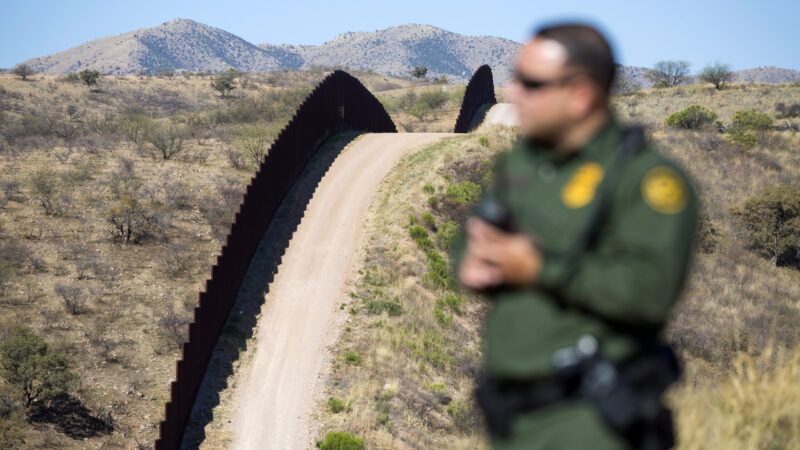Abolish ICE? Actually, Biden's Budget Proposal Hikes Spending on America's Immigration Cops.
More spending on more intrusive government is the Biden agenda all the way down.

At a political rally in Georgia two months ago, President Joe Biden was interrupted by a small but loud group of protestors demanding that he "abolish" Immigration and Customs Enforcement (ICE), the branch of the Department of Homeland Security that's responsible for capturing and deporting undocumented immigrants.
"I agree with you," Biden offered, after halting his speech to engage briefly with the chanting activists. "I'm working on it, man. Give me another five days."
Roughly five weeks later, Biden's first presidential budget proposal has arrived. It shows that the president isn't planning to abolish ICE at all. In fact, he's asking Congress to spend even more on America's immigration cops—a development that sits uncomfortably alongside political rhetoric on both sides of the aisle.
Biden's budget proposal calls for appropriating more than $7.99 billion in discretionary funding to ICE during the fiscal year that begins on October 1. That's about $18 million higher than what Congress authorized for the current fiscal year. If implemented as proposed, Biden's budget would see the federal government spend more on ICE than it did during three of former President Donald Trump's four years in office—and it represents a 23 percent increase over the final budget overseen by former President Barack Obama.
In short, Biden's budget locks in the Trump-era surge in funding for ICE—a surge that caused significant outrage on the political left, as the protesters at Biden's April speech evince.
The requested budget increase would allow ICE to hire about 100 more attorneys and dozens of additional staffers in various departments. "These enhancements will address the backlog of immigration cases," according to the agency's budget proposal.
While that shift in priorities is in some ways commendable, it comes with only a small reduction in ICE's "Enforcement and Removal Operations," which consumes the largest share of the agency's budget. That section of the budget would receive $4.07 billion next year in Biden's budget, down from $4.12 billion this year. Among lots of other things, the budget document shows that ICE is seeking enough funding to be able to detain up to 30,000 people daily—a small decrease from the 31,500 in the current year's budget—and requesting $2 million "for awards of compensation to informants" who narc on undocumented immigrants.
The budget proposal is the latest signal that Biden is disappointing progressives who hoped he would take more radical action to undo Trump's immigration enforcement legacy. But it also reveals just how disconnected from reality some conservative talking points about Biden's immigration policy have become.
The Center for Immigration Studies, which has long favored restricting both legal and illegal immigration, has declared that the Biden administration "is abolishing ICE without abolishing ICE" due to some policy changes implemented in the first weeks after Biden took office. After Biden's budget proposal was unveiled on Friday, the Republican National Committee accused the president of "functionally abolishing ICE."
It should go without saying, but that description is hardly an accurate way to describe a government agency given the money and resources to lock up 30,000 human beings.
As always happens, the red/blue political fights conceal the reality of the situation. In the context of the rest of Biden's $6 trillion budget proposal, however, the higher funding for ICE is part of an overall trend toward not only a more expensive government, but also a government that can stick its nose (and its guns) into more of your business. That means beefing up the IRS' ability to snoop on bank accounts under the guise of cracking down on tax cheats—and, ultimately, in pursuit of additional tax revenue to spend. It means an immigration budget proposal that maintains Trump-era levels of enforcement "against employers that hire labor illegally"—people who have done nothing wrong besides offering to pay for work that someone else is willing to do.
Of course, Biden is taking a different approach than Trump did in some important ways. The new administration has nixed Trump's "zero tolerance" policy at the U.S.-Mexico border that separated parents and children who crossed the border illegally without exception, but that change was mostly a symbolic one since the policy was effectively nullified by the end of the Trump administration, as Reason's Billy Binion reported in March. And, as Reason's Fiona Harrigan noted yesterday, the Biden administration is hoping to staunch the flow of migrants by spending $4 billion to improve conditions in the so-called "Northern Triangle" countries of El Salvador, Guatemala, and Honduras.
The budget proposal for ICE does not tell the whole story of a White House's immigration policy, but it does provide a useful window into certain priorities. Rather than making a clean break with Trump's punitive approach toward undocumented immigrants, Biden's first budget plan aims to mostly maintain that status quo.


Show Comments (61)